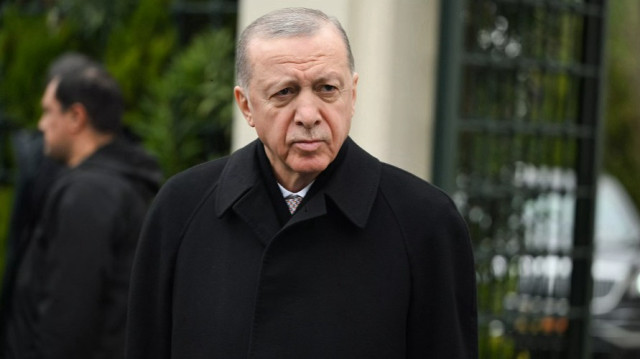
Stable Syria will hold 'very strong position in Islamic world,' Erdogan tells journalists on return flight from Cairo
Turkish President Recep Tayyip Erdogan on Friday reaffirmed his country's commitment to assisting Syria during its transition process following the collapse of the Bashar Assad regime earlier this month.
"We are supporting the Syrian people in managing the transition process smoothly, without any setbacks along the way," Erdogan told journalists on his return flight from Cairo, where he attended 11th D-8 Summit on Thursday.
He also announced that Turkish Foreign Minister Hakan Fidan would soon be visiting Syria to work on the "new structure" to be established in the country.
"If Syria establishes a truly stable structure with this new formation, it will, in my view, hold a very strong position in the Islamic world," he added.
Addressing pressing issues such as energy shortages and security challenges in the neighboring country, Erdogan pledged to resolve Syria's energy problems swiftly and to strengthen trade relations with both Damascus and Iraq.
"We will intensify our trade ties with Iraq and Syria. This will bring new momentum to both Syria and Türkiye in every respect," he noted.
Erdogan also addressed regional security concerns, calling for consistency in how Western countries treat terrorist groups.
"Just as Daesh/ISIS cannot hold demonstrations in the streets and squares of Western countries, neither should the PKK and its affiliates," he said.
Emphasizing the diminished influence of the PKK, Erdogan declared that the terror group and affiliated organizations have "reached the end of their lifespan."
On broader geopolitical issues, Erdogan urged Western nations, particularly the US, to take action against Israel's occupation of Syrian territories.
"It must be declared loudly that Israel's occupation of Syrian territories is unacceptable," he asserted.
Erdogan also highlighted the atrocities committed at Sednaya Prison, located near Damascus, under Assad's rule as emblematic of his regime's abuses.
"The atrocities, extrajudicial killings, and injustices there are among the most painful images of the reality (under the) Ba'ath regime," he said, vowing to "pursue accountability for these crimes under international law."

